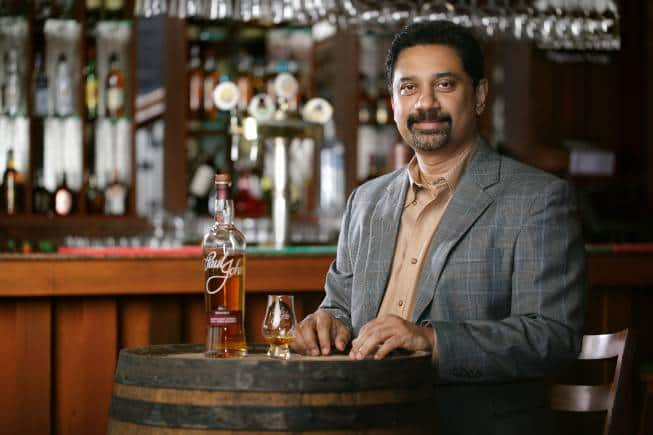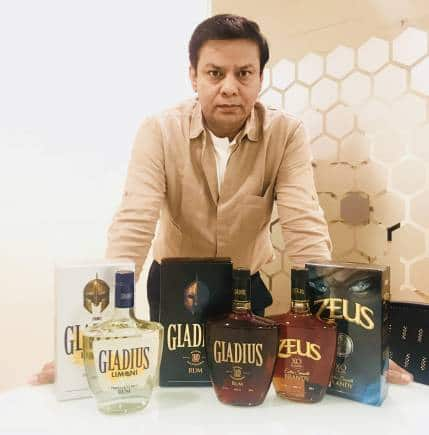



Paul P. John, Chairman, Paul John Whisky
The alco-bev segment will be shored up by intimate celebrations: Alco-bev is a dynamic sector and luxury and ultra-premium brands are being consumed more at home now. There will be more intimate celebrations and consumption occasions will increase. Conspicuous consumption will reduce and the trend will shift towards satisfying hedonistic needs. It will take consumers some time to begin venturing out and spend a premium over existing prices at bars and restaurants.
The spirits industry will focus on building sustainable business models: The focus will also be on building luxury brands with innovation at their core so that conglomerates can protect their interests in case of contingencies. Finally, and most importantly, delivering at an affordable price will be important.
 Paul P. John, Chairman, Paul John Whisky
Paul P. John, Chairman, Paul John Whisky
The concept of luxury may be redefined: Every luxury consumer has been influenced by the need for safety and security and this has affected their spending power. But you may see a revenge spending trend for a small period post-COVID, during the recovery phase. We may witness Indian luxury brands, including whisky, fashion, jewellery, etc. do well due to restrictions in choices that consumers face. At Paul John, we believe luxury is an unparalleled experience, enhanced by-products or services. For instance, sitting at home, enjoying a great whisky with close friends is surely a memorable luxurious experience.
Sumit Jaiswal, Assistant Vice President – Marketing & EXIM, Grover Zampa Vineyards
Globally, alco-bev markets and brands have been subject to massive volatility: There have been mass shut-down of on-premise stores in many countries. Home consumption has replaced “going out for a drink”.
Wine sales will soon go going online: That is the only way to reach a wider consumer base and add another sale channel to our sales repertoire.
We are hopeful that the government will offer India’s wine industry more benefits on the ground: Wine is an agronomical product. The grape output and quality depend on the vagaries of nature which can negatively impact farmers, resulting in deep losses. That will ultimately affect the wineries as well, which is not the case with other alco-bev categories.
Rationalising taxes in crucial: The government should meet global benchmarks and tax wine lower on the ground in comparison to other alco-bev categories, a practice followed across the world and more so in the wine-producing nations.
Wine packaging will see a radical change: It is going to evolve from traditional glass bottles to cans and other convenient packaging.
The need to develop a premium range of wines: In developing countries, wine is treated more as an occasional drink than a drink you have at the end of the day or a meal companion. Millennials prefer hard liquor over wines. There is a need to develop premium wines locally to drive more consumption. Owing to the lockdowns and travel restrictions, several wine connoisseurs have developed a taste for local premium wines. I believe that a lot of imported wine consumers will swiftly move towards fine domestic wines such as our La Reserve, VA Collection, Chene, and Insignia.
 Sumit Jaiswal - AVP, Marketing and Exim at Grover Zampa Vineyards
Sumit Jaiswal - AVP, Marketing and Exim at Grover Zampa Vineyards
Luxury is more of pure emotion and less of function: It is a symbol of quality, a sign of authenticity and enjoys a halo of exclusivity. However, the 2020 lockdown instilled in me a lot of mindfulness and gratitude. Now, I would be very selective in spending on luxury. I will be less driven by impulse indulgence, avoid any excess and spend on luxury with a cause.
Sakshi Saigal, Co-founder & Director, Stranger & Sons
Gin is going through an extremely exciting phase in India right now: Although India has predominantly been a brown spirits market for years, gin is starting to transcend into the mainstream. Craft brands are currently redefining the perception of premiumness and I think we played an important role in highlighting the concept of premium spirits through Stranger & Sons. The response we received when we travelled with our bottle to bars around the world and sent it for being judged at various competitions was incredible. We even bagged a Gold Outstanding at IWSC 2020 in London, which was a first for India. The journey for Indian gins is just beginning.
Changing consumption patterns rewards innovation: With India’s growing cocktail culture, we see a lot of consumers are open to trying new, atypical cocktails and home-grown products. Also with a restaurant’s cocktail menu plays a decisive role in attracting people to visit it, consumption style in India is bound to change. At the forefront of this movement are highly sought-after bartenders, whose cocktail programs seek to capitalise on the public's desire for exciting and distinctive drinks.
The once-prized bottles from abroad are being replaced by numerous home-grown brands: Over the next few years, I expect to see innovation and originality to shine in the industry. Surely, more craft distilleries will come up in India and so will new products from us.
It’s the time for mavericks, rule breakers and new thinkers! This difficult time will define how our customers choose to consume our products and what we need to do to get their attention. Consequently, it has become extremely important to be agile and responsive. It takes time, energy and resources for large brands to realign their machinery and change course, but start-ups don’t have that baggage and weight.
Home consumption will encourage consumers to experiment: With home consumption bound to increase, as we have seen globally, with bars and restaurants yet to reopen completely, people are leaning towards creative choices. Spirit brands will have to focus on authenticity, craftsmanship and embracing creativity to produce something uniquely ground-breaking. What we produce no longer has to be old and stuffy; it can be contemporary and urban! We see that a lot of Indian consumers are willing to try a quality Indian product, like our inherently Indian gin. At Third Eye Distillery (where Strangers & Sons gin is made), not a single day goes by when either one of us (the founders) or Charnelle, our head distiller, isn’t tinkering with some new method or product. We are constantly trying to do our bit to make our distillery more responsible and sustainable while also exploring new extensions and experimenting with various ideas.
The crisis has reshaped how we approach the business: Being aware that it has been an extremely tough phase for the hospitality industry and brands including ours, we have leveraged our teams’ sheer creativity and persistence and never lost sight of our consumers, favourite bars and bartenders to stay afloat. In Singapore, we collaborated with some of the best bars and launched ‘Strange Times’ bottled cocktails as an initiative to support the trade and help keep the spirits up. We also shipped bottles to 100,000 homes across the UK with the idea of elevating their home-drinking experience when we got picked as the first Indian brand for the Craft Gin Club (a subscription box service that provides gin enthusiasts in the UK with a new gin every month). Locally, we launched India’s first distilled cocktail, Perry Road Peru, which was a massive success. Regardless of the digital shift, we continue to prioritize innovation, crafting immersive experiences and strengthening our relationships with consumers and trade alike.
As the digital shift takes place, there may be a rise in home deliveries: Right now, India follows a federal system of laws when it comes to alcohol. The guidelines and regulations vary across states in India. With a handful of states allowing home deliveries in a limited capacity for the spirits segment, we imagine it may expand to other states soon. It adds great convenience and value as an alternate channel for consumers. As the digital shift is accelerated by the pandemic, we expect a similar impact on the spirits industry.
 Sakshi Saigal, Co-founder & Director, Stranger & Sons
Sakshi Saigal, Co-founder & Director, Stranger & Sons
Sustainability is the core of our operations: Right from managing the water waste at our distillery to employing local women to help us make pickles and cordials from the remaining fruits used for every batch of gin, we collaborate with brands that have social consciousness built into their DNA. The botanicals are used as a whole, with no part discarded as waste, including the water used during distillation which is recycled to water the botanical garden.
Varun Jain, Founder and CEO, SMOKE LAB.
Storytelling will be important: I foresee the rise of craft spirits as domestic brands gain traction. I see a lot of emerging products, including gin, rum and beer. People are likely to relate to a product’s story.
 Varun Jain, Founder and CEO, SMOKE LAB
Varun Jain, Founder and CEO, SMOKE LAB
Government is likely to implement new policies: As the current crisis deepened, consumers and travellers were forced to rethink and adapt, and brands in the luxury spirits space had to keep up with these changes. Offering customers products and services in the comfort of their space forms the bedrock of luxury now. While we are directly communicating with our consumers, home delivery has been an issue in certain areas. But new policies will be implemented by the government, particularly since we will see a rise in online deliveries across all states. Liquor delivery and easy availability are likely to be normalised.
Pooja Bajaj Chadha, CEO, Dr's Brandy Reserve no.1 and Burlingtons
Local produce will emerge stronger from the crisis: From chocolate and clothes to wine and brandy, the local premium and luxury brands are witnessing an upswing in opportunity. It is now up to the brand to up their ante and production to meet market demands. Consumers want to know the provenance of the produce, as against blindly consuming labels. We are ready to launch our brand new brandy, Burlingtons, in a few weeks. There is a paradigm shift in perception and the blind following of international brands. Consumers want to innovate, experiment and make a choice based on their personal experiences. We have been compelled to look inwards. We realised that there is so much on offer in India that has been ignored over years. The brands have also been laid-back, but we now realise that the market is there for Indian brands, and will be here to stay if we understand and adapt our offerings to be in sync with the consumer's expectations.
 Pooja Bajaj Chadha, CEO, Dr's Brandy Reserve no.1 and Burlingtons
Pooja Bajaj Chadha, CEO, Dr's Brandy Reserve no.1 and Burlingtons
Simple luxurious indulgences: In a post-COVID world, I associate luxury with a sip of a beautiful drink from my bar, poured in crystal that has sat forever, and savouring it in my own lounge at home. This is literally what we have done through 2020 — filled our homes and hearts with things we love, created magical, beautiful experiences and enjoyed every one of those luxurious moments, despite being personally affected by the pandemic.
Shivam Ginglani, CEO Black Bow
The WFH culture and its financial implications are transforming the concept of luxury: Consumers will look for quality design and product, a cool quotient and a more accessible price point. In keeping with the concept of accessible luxury, we have launched Black Bow Himlayan Whiskey and Woodsmen for the next generation of consumers.
Premiumisation of the spirits segment will lead to growth: As per International Wine and Spirit Research’s (IWSR) report for the 2010-2019 decade, the premium and semi-premium whisky segments have grown at a healthy CAGR of 12+%. Barring the year 2020, we are positive that the premium and semi-premium whisky segments are forecasted to grow double digits every year considering both a young median age for India as well as premiumisation trends were seen across industries. The alco-bev industry has rebounded faster than other sectors because of the nature of the business and customer needs.
Value-for-money will at the core of consumer demand: The liquor industry is competitive and the pandemic will further require the industry to deliver on VFM. Companies will need to push the pedal down on being more innovative and find new ways to engage with the consumers. There will be a greater focus on customer loyalty and satisfaction and brands who deliver value will survive and the consumers will be the biggest winner.
 Shivam Ginglani, CEO Black Bow
Shivam Ginglani, CEO Black Bow
Sustainability will no longer just be a conversation point: This is even more important for the luxury segment, as it can set precedence for other segments by being conscious about their choices. Brands that imbibe the sustainability ethos will connect with luxury consumers in a more meaningful way.
Rahul Gagerna, MD & Co-founder, Boutique Spirit Brands
We may see a downgrade of segmentation: What that means is a single malt consumer might switch to scotch. People who loved going to bars may prefer drinking at home, not just because of the pandemic but also because they are not sure about their income levels sustaining in the future. Yet, a trend like the premiumisation of brands will endure and the choice of aspirational and premium brands will regain momentum once vaccination speeds up. We are working on various premium categories and will soon be launching some exciting spirits.
Gin will finally make a space for itself: We are looking at a growth of at least 5% in 2021 for the spirits industry. Whisky shall continue to dominate the market but gin will finally make a space for itself in the bars.
Spirit making companies are attempting to look at how they can conserve the environment: Premiumisation and a sharp focus on the bottom-line have led organisations to introduce a culture of sustainability in their operations. Consumers are conscious about what they consume and are interested in understanding where raw materials are sourced from and what is a company’s contribution towards society and the environment. The spirit industry is making serious efforts to reduce the consumption of water, establish distilleries in areas that don’t harm the environment and employment opportunities for local people.
 Rahul Gagerna, MD & Co-founder, Boutique Spirit Brands
Rahul Gagerna, MD & Co-founder, Boutique Spirit Brands
My desire for luxury inspires me every day to work hard: I still aspire to buy that luxury car and own my favourite watch, though COIVD might have delayed when I buy what I desire. The pandemic has taught me to work harder for achieving my goals.
Anand Virmani, Founder & CEO, Nao Spirits & Beverages
Consumption patterns are indicating a preference skew towards retail: With most people continuing to stay-at-home, retail is gaining ground. Easy-to-make cocktails such as gin and tonic are going to absolutely take-off.
Consumers are upgrading brands: Most consumers are choosing to drink better. They no longer have to pay the mark-up charged at a bar or restaurant and can, instead, pick up at MRP. There is more attention to detail at the home-bar with better ice, glassware and mixers.
‘Going out’ will never be the same: We are still not sure how this segment will evolve, but it will look different from what it did before. Overcrowded, cramped bars are not where people want to be right now.
 Anand Virmani, Founder & CEO, Nao Spirits & Beverages
Anand Virmani, Founder & CEO, Nao Spirits & Beverages
Financial stability is the biggest luxury we can possess: Till last year, I would have said that time was the biggest luxury one could afford. 2020 brought all of us back to earth! Professionally and personally, I realise how important a financial cushion is in uncertain times. With people losing their livelihoods en masse, those who were able to sail through will count themselves lucky. In a high-growth segment such as the spirits industry, financial sustainability is not necessarily as prioritised as market share. But this past year will get everyone to apply the brakes and be a lot more cautious. At a personal level, the need for ‘emotional luxury’ and companionship has never been more pronounced. Having the ability to cope with global upheaval is no small feat, but one needs that strength to call upon.
Sonal Holland, Master of Wine
Uncorking a bottle of wine every other evening is a stay-at-home luxury experience: As more than half the world finds itself confined to their homes, uncorking a bottle of wine every other evening is considered an affordable luxury. The pandemic has resulted in a big uptick in alco-bev sales over the past few months and this buoyancy is expected to continue.
People will upgrade their lifestyle and entertain with better drinks: This will propel the premiumisation wave. Also, education, events and experiences will be consumed digitally and this is likely to continue over the next two years.
 Sonal Holland, Master of Wine
Sonal Holland, Master of Wine
There has been a shift from brand-centric luxury to prioritising what is essential luxury: Consumers are seeking products, services and experiences that add innate value and meaning to their daily lifestyle and help elevate it to what can be defined as a well-balanced, happy and healthy life. Luxury holds an innate value, meaning and relevance that I can inculcate as part of my daily lifestyle. In that sense, healthy habits, close family ties, help at hand and a stable financial situation all mean luxury to me.
Discover the latest Business News, Sensex, and Nifty updates. Obtain Personal Finance insights, tax queries, and expert opinions on Moneycontrol or download the Moneycontrol App to stay updated!
Find the best of Al News in one place, specially curated for you every weekend.
Stay on top of the latest tech trends and biggest startup news.